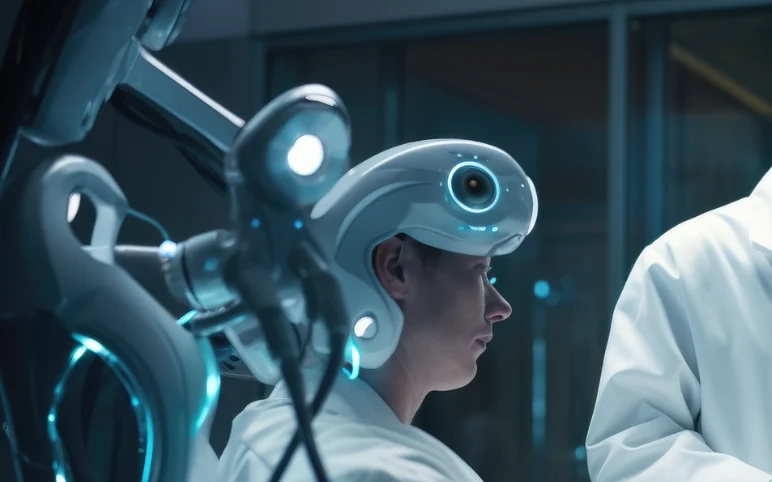Pondering over the future of healthcare, a trip to a hospital does not seem to fit in the picture now. The emergence of advanced technologies, advantages of using AI in healthcare, increasing per capita income of people, adaptation to an online and on-demand world, increase in the prevalence of chronic disease patients and so many other reasons have pushed towards a change in the delivery of healthcare services and outpatient care. The COVID-19 pandemic added fuel to the fire of changing healthcare trends. People who earlier relied more on in-person doctor consultations and hospital utilizations are now seeking comfort in tele-medicines, online consultations-and all of this attributable to convenience, and avoiding exposure to risks.
While healthcare technologies are increasingly making inroads; there are potential dangers that come with the digitalization of the healthcare industry that humankind can not ignore. Here are a few of the hazards or say cons that technology might bring with itself in the age of digital health:
Theft of medical information!
Every year hackers steal thousands of medical records from healthcare institutions that contain patient’s personal information, health insurance credentials, and other crucial information to get benefits such as reimbursements, free medical services or to sell the information at darknet for money. Not to forget, in 2016 when Banner Health announced the leak of information of millions of patients ascribed to the breach of its food and beverage outlets’ payment processing system. What made it worse was that it took a month to discover the breach.
Banner Health is not the only one that reported the cyberattacks. Several Health insurers including Premera, Health quest, MU Health, and others have from time to time reported such incidents.
Towards zeroing an empathetic relationship!
In an age that is preparing itself for more pervasive technology, Artificial Intelligence is bound to control people’s daily lives, their decisions and choices. In today’s healthcare environment, where empathy, trust and care form the core of the patient care system, with the advent of AI, the same sentiment will be lost in a vacuum. We all crave human affection, love and touch, especially, when sick or going through tough times, however, AI will fail to deliver such care.
AI and Injuries/errors!
Machines are bound to be broken. There will always be the risk of AI failing to perform right, commit mistakes and that may result in injury or health-related issues causing distress. There is no denying that injuries can and have been there even when there was no AI involved, however, errors on the part of AI would be difficult to overlook. Moreover, a glitch in single software can lead to errors in several machines in which that particular erroneous software is installed, thus, increasing the chances of risks.
Skewed algorithms?
Humans are biased. However, in a job of tending and catering to patients, biasedness has no room. But what if the algorithms are tapered to design in such a manner that gives more weightage to profits rather than patient health or diagnosis is made based on the paying capability of any patient, thereby, prescribing unnecessary tests and hospital stays? What about cultural biases and if they are being passed on? This is one of the serious issues that come with the use of AI and it will be onerous for the stakeholders in Healthcare or Biomedics ethics to identify and deal with.
Training AI!
Training AI to analyze the data, and produce results is not an easy task. It requires resources in the form of human, time, and money. Further, there will also be a need of training the staff to use and train AI for a particular process. The job role of physicians will change as per the new demands and changes involving collaborations with AI, managing and improvising their techniques, rating and recommending their work and so on. Thus, it is a time and money-intensive process.
Constant up-gradation of AI!
With evolving times, disease patterns will change, and it will call for an up-gradation in the algorithms of the software to match with the changes. It will add to costs exponentially. Keeping in mind the disparity in the income of the nations, will it be feasible enough for each nation to adopt and invest in AI in healthcare? Obviously not! Not all countries will be readily adapting to changes and will take years to do so. Thus, it may create inconsistencies in case a person from a middle or lower income group opts to get treatment at a high-end healthcare institution in a higher-income economy.
False-Negatives/ Positives?
Medical imaging has emerged as a revolutionary tool in diagnosing. However, according to a new study, led by the University of Cambridge and Simon Fraser University, Machine learning and AI are highly unstable in medical image reconstruction. These can lead to myriad artefacts, or unwanted alterations in the data, causing errors in the final images, thus, false positives and false negatives. (Antun, V., et al. (2020))
Further, there can be other situations where AI may not be wise enough to chart out a specific diagnostic or treatment course as it may not take into consideration of other potential side effects or comorbidities.
Undeniably, AI has loads of benefits, which is why several companies are heavily investing in it. AI is transforming and innovating healthcare service dispensing in a spectrum of ways ranging from clinical operations, drug development and delivery, data management, diagnosing, surgery, and patient engagement. It can be clarified from the fact that the number of approved and CE-marked AI/ML-based medical devices has soared significantly since 2015, with the majority receiving approval in radiology and cardiology segments. Companies such as AliveCor, QbCheck, InPen, Lumify, EnsoSleep, Lepu Medical and BioFlux, Subtle Medical, Bay Labs, Viz.AI, Watson Health, Behold.ai, Recursion Pharmaceuticals, Deep Genomics, Arterys, Empatica, Medtronic, Icometrix, NeuralBot, MindMotion Go, and several others actively engaged in the domain, the need of AI in healthcare is fairly visible.
However, there would be pitfalls as well; and it will require serious measures to combat them. High-quality data and data security will help produce secured, unbiased, and trained AI algorithms. Standard guidelines for approval and implementation of AI devices will help execute the process on a large scale. Then, there is a dire need for novel approaches to fund, analyze, evaluate and reimburse technologies. Besides financial and security challenges, AI implementation in healthcare will aslo face ethical challenges, and stakeholders in favor of the cause will have to earn the trust of the patients for smooth execution. Thus, the entry of AI into healthcare is long and in no way smooth, however, looking at the rapid adoption of technology in day-to-day life, not at all surprising.



